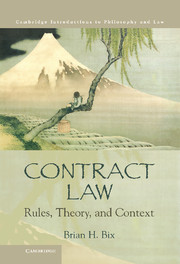Book contents
- Frontmatter
- Contents
- Preface
- 1 Philosophical Problems of Contract Law
- 2 History and Sources
- 3 Formation
- 4 Interpretation
- 5 Performance
- 6 Enforcement and Remedies
- 7 Special Categories of Contract Law
- 8 Modern Contract Law Practices
- 9 How Many Contract Laws?
- Bibliography
- Table of Cases
- Statutes and Restatements
- Index
- References
7 - Special Categories of Contract Law
Published online by Cambridge University Press: 05 November 2012
- Frontmatter
- Contents
- Preface
- 1 Philosophical Problems of Contract Law
- 2 History and Sources
- 3 Formation
- 4 Interpretation
- 5 Performance
- 6 Enforcement and Remedies
- 7 Special Categories of Contract Law
- 8 Modern Contract Law Practices
- 9 How Many Contract Laws?
- Bibliography
- Table of Cases
- Statutes and Restatements
- Index
- References
Summary
As is discussed at greater length in Chapter 9, there is a sense in which we do not have a single simple and unitary (American) contract law but rather a large number of contract laws, reflecting both different jurisdictions and different topics. Lawrence Friedman once famously argued that contract law was merely the law for the remnants, the principles for transactions too unimportant not to have their own distinct set of statutory or administrative regulations. This is likely an overstatement, but it remains the case that there are many types of transactions, broadly contractual, which have distinctive sets of governing rules. Whole books and courses are devoted to some of these categories; what can be offered here in this chapter is necessarily just a taste of the both the variety and complexity of those subjects.
EMPLOYMENT AGREEMENTS
A distinct topic of employment law has developed to cover the many statutory and judicially created special rules that attach to the employer-employee contract. There are state law rules that govern the employment relationship (some of which derive from judicial decisions many decades old), state and federal antidiscrimination rules, and federal labor law rules grounded in statutes and administrative agency action. Additionally, where the employment is a civil service job or one covered by a union, there are state or federal statutory or administrative rules controlling issues of hiring, promotion, firing, and the handling of disputes.
- Type
- Chapter
- Information
- Contract LawRules, Theory, and Context, pp. 119 - 127Publisher: Cambridge University PressPrint publication year: 2012
References
- 1
- Cited by

